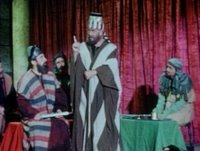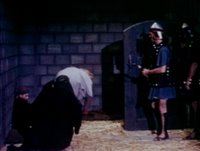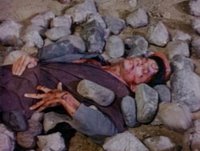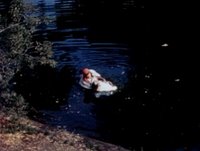 Back in September, I covered how the various film treatments of the book of Acts and the ministries of Peter and Paul depicted the dispute surrounding gentile admission to the church. There was one portrayal that was new to me at the time, which I'd been meaning to catch for a while - the Acts of the Apostles series from The Living Bible. This series was filmed in 1957, by a church based group, who also did various Old Testament Characters (incl. Elijah, Ruth and Gideon, and a series on Jesus. Anyway, I'm going to work my way through this series posting comments on a few episodes at a time along the way.
Back in September, I covered how the various film treatments of the book of Acts and the ministries of Peter and Paul depicted the dispute surrounding gentile admission to the church. There was one portrayal that was new to me at the time, which I'd been meaning to catch for a while - the Acts of the Apostles series from The Living Bible. This series was filmed in 1957, by a church based group, who also did various Old Testament Characters (incl. Elijah, Ruth and Gideon, and a series on Jesus. Anyway, I'm going to work my way through this series posting comments on a few episodes at a time along the way.Acts of the Apostles Episode 1 – Endued with Power
Ascension recounted - (Acts 1:1-11)
Pentecost - (Acts 2:1-41)
Peter heals a beggar – (Acts 3:1-10)
Peter preaches to the onlookers – (Acts 3:11-26)
Peter, John and the Sanhedrin – (Acts 4:1-22)
Apostles heal many – (Acts 5:12-16)
Apostles Escape from Prison – (Acts 5:17-26)
Apostles before Sanhedrin – (Acts 5:27-42)
[Extra-biblical episode - Jewish Authorities persecute the early church]
 As I've mentioned before, this is a very low budget series, and this opening episode makes that clear right from the off. Hence the ascension is not shown, merely recounted by the apostle John. This does have the benefit of leaving a difficult to visualise episode in the viewer's imagination, and focussing instead on the meaning of that event to the first Christians. Similarly, the tongues of fire arriving at Pentecost are kept off camera, yet referred to. What we see instead is the faces of the Parthians, Arabs etc. as they see what is occurring. This is typical, low budget stuff, but it was actually one of the most interesting treatments of this episode I can recall. Usually the effects look a bit hokey, and have to decide whether these "tongues" were an objective reality, as well as a subjective one. Furthermore, it places the focus on the crowd, who generally aren't really considered by these films.
As I've mentioned before, this is a very low budget series, and this opening episode makes that clear right from the off. Hence the ascension is not shown, merely recounted by the apostle John. This does have the benefit of leaving a difficult to visualise episode in the viewer's imagination, and focussing instead on the meaning of that event to the first Christians. Similarly, the tongues of fire arriving at Pentecost are kept off camera, yet referred to. What we see instead is the faces of the Parthians, Arabs etc. as they see what is occurring. This is typical, low budget stuff, but it was actually one of the most interesting treatments of this episode I can recall. Usually the effects look a bit hokey, and have to decide whether these "tongues" were an objective reality, as well as a subjective one. Furthermore, it places the focus on the crowd, who generally aren't really considered by these films.Whilst the majority of the first five chapters of Acts are covered here, one incident is conspicuous by its absence - the deaths of Ananias and Saphira. This is a bit of a thorny episode causing problems for both those who claim that the cross soothed God's wrath, and those who consider there to be a more notable discrepancy between the God of the Old Testament and the God of the New. Actually it's interesting that the text never states that it was God who kills them. Whilst in our culture this seems to be the most obvious reading, it is also possible that either this was just an incredible coincidence, or that they died through fear, or that someone else killed them. Whichever way you go, (early) Christianity doesn't come out of it looking too good.
 Finally, on this episode, the film makes on significant addition. Following on from Gamaliel's speech in Acts 5, the Sanhedrin not only flog the apostles before them, but continue a campaign of persecution against them. Whilst Acts does place the blame for Stephen's death on the Sanhedrin, it suggests that it was this incident that initiated the violence against the church, rather than simply being part of an ongoing campaign. Flogging was very much a form of internal discipline, whilst Saul's later campaign (Acts 8) suggest that the earl church was now considered by some as outside of the acceptable bounds of Judaism. The script for this montage describes what is happening by saying "Physical pain became their test, and lashes of the whip their badges of honour". Nowadays, it's hard not to see this in the light of The Passion of the Christ.
Finally, on this episode, the film makes on significant addition. Following on from Gamaliel's speech in Acts 5, the Sanhedrin not only flog the apostles before them, but continue a campaign of persecution against them. Whilst Acts does place the blame for Stephen's death on the Sanhedrin, it suggests that it was this incident that initiated the violence against the church, rather than simply being part of an ongoing campaign. Flogging was very much a form of internal discipline, whilst Saul's later campaign (Acts 8) suggest that the earl church was now considered by some as outside of the acceptable bounds of Judaism. The script for this montage describes what is happening by saying "Physical pain became their test, and lashes of the whip their badges of honour". Nowadays, it's hard not to see this in the light of The Passion of the Christ.Acts Episode 2 – A Faithful Witness
Deacons chosen – (Acts 6:1-7)
Stoning of Stephen – (Acts 7:54-8:1)
Persecution of early church – (Acts 8:2-3)
Philip in Samaria – (Acts 8:4-25)
Philip and the Ethiopian Eunuch – (Acts 8:26-40)
 This episode covers in some depth events that are often excluded from films about the early church, which is mainly because many of these films focus on Peter, or Paul, rather than the other apostles who were also part of the early church. It's appropriate, then, that it starts with the choosing of the seven (Acts 6). It's interesting how these seven are initially selected to "wait on tables", but quickly graduate to bigger things (although this assumes it is this Philip, rather than the disciple found in the gospels).
This episode covers in some depth events that are often excluded from films about the early church, which is mainly because many of these films focus on Peter, or Paul, rather than the other apostles who were also part of the early church. It's appropriate, then, that it starts with the choosing of the seven (Acts 6). It's interesting how these seven are initially selected to "wait on tables", but quickly graduate to bigger things (although this assumes it is this Philip, rather than the disciple found in the gospels).Strangely, the narration to the film implies that there were a number of martyrs before Stephen, noting ominously how there were a growing number of widows because of the persecution. However, later on we see Stephen stoned, and there the narrator calls Stephen the first Christian martyr.
The other major incident here is that of the Ethiopian Eunuch. Here the Eunuch sits awkwardly in a Ben Hur style chariot (how many kinds were there) reading the scriptures whilst his driver takes a break. As the Ethiopian (who is not called a Eunuch in the film, presumably to save awkward questions from curious Sunday schoolers) reads the text before him, both he and Philip quote significantly more of Isaiah's suffering servant passage than Acts records.
 Whilst it's likely that their discussion was longer than Acts records, this is also the reading back into Acts a later Christian association, notably with substitutionary atonement theology. It's interesting that, this is one of seven NT references to Isaiah 53 (Matt 8:17, Mark 15:28, Luke 22:37, John 12:38, Acts 8:32–33, Rom 10:16 and 1 Pet 2:22–24) yet the parts of that passage which support substitutionary atonement are notably absent here (and in the other six, except, possibly, the 1 Peter reference).
Whilst it's likely that their discussion was longer than Acts records, this is also the reading back into Acts a later Christian association, notably with substitutionary atonement theology. It's interesting that, this is one of seven NT references to Isaiah 53 (Matt 8:17, Mark 15:28, Luke 22:37, John 12:38, Acts 8:32–33, Rom 10:16 and 1 Pet 2:22–24) yet the parts of that passage which support substitutionary atonement are notably absent here (and in the other six, except, possibly, the 1 Peter reference).Finally, I always like to observe how New Testament films deals with baptism, and here it is full immersion baptism (with the Eunuch lowered backwards into the water as shown).
No comments:
Post a Comment